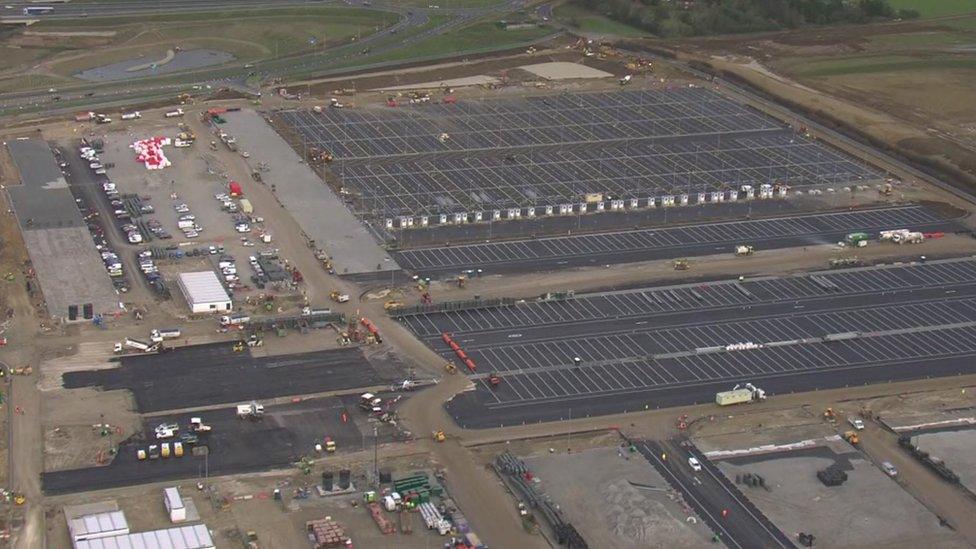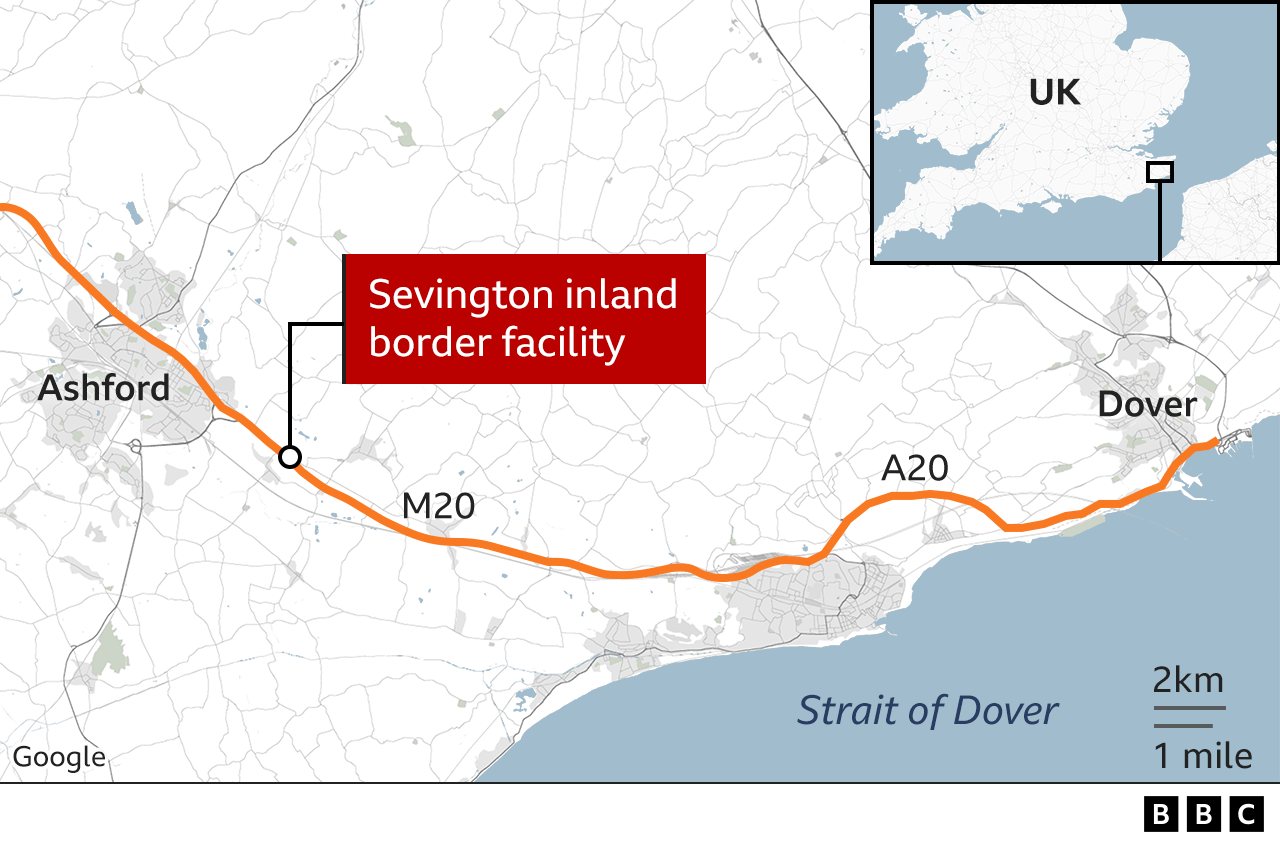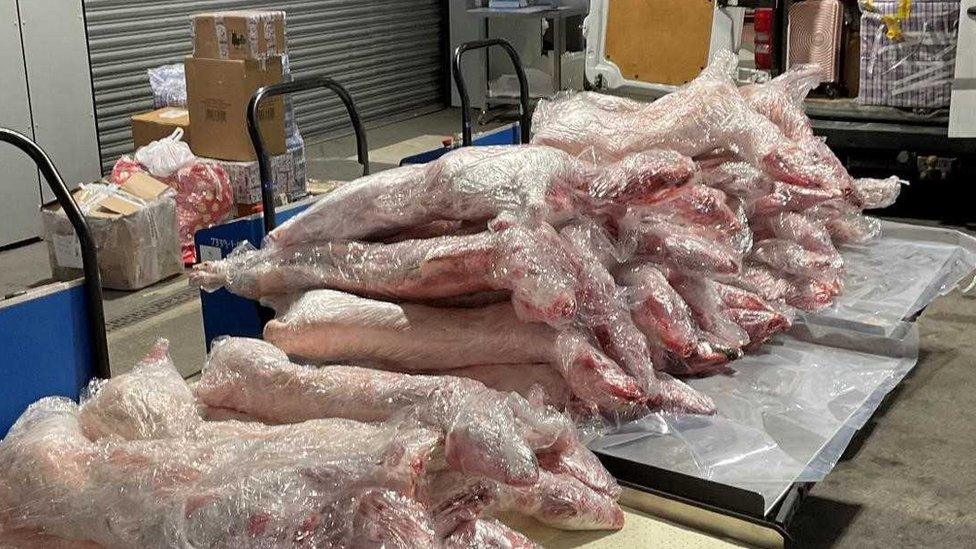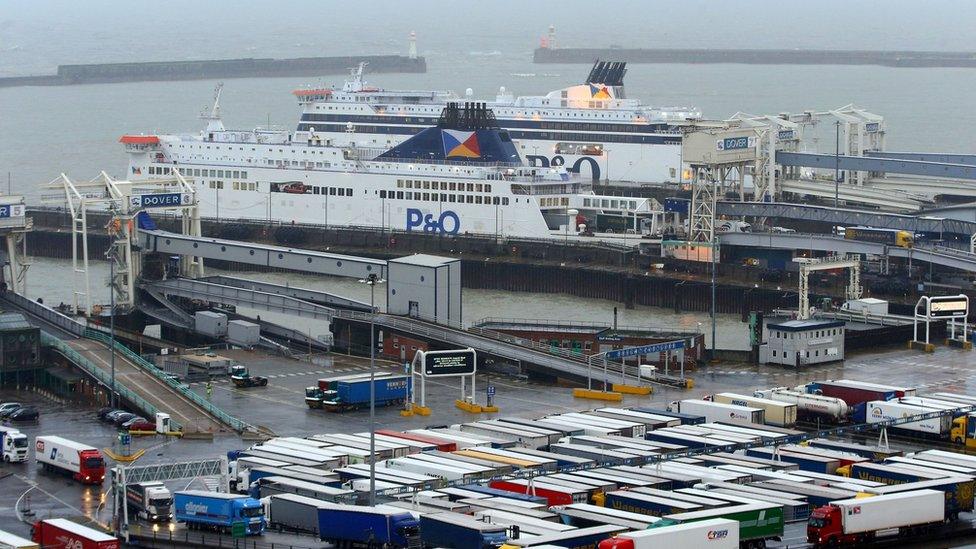Dover legal battle looms over food checks
- Published

The Sevington Inland Border Facility, 22 miles away from Dover, is designed to detect illegal produce
Dover health chiefs are on the brink of major legal action against the government over plans to end checks for potentially dangerous foods at the UK's most important ferry terminal.
They warn that illegal food could reach the British plate if commercial lorry inspections are moved 22 miles inland.
Officials fear the changes, a consequence of Brexit, smash a hole in the UK's biosecurity measures.
The government says the new inland facility will ensure biosecurity.
But Dover District Council and its Port Health Authority (DPHA) are urging the government to pause the plans - saying it breaks their legal duties to keep the UK's food supply safe amid fears the move could increase the risk of diseases.
The legal threat to the government would mean asking the High Court to rule whether ministers have broken a series of laws including fully considering the evidence of the risks.
It comes after months of behind-the-scenes arguments over the government's post-Brexit plans for a new commercial food-checking system at Sevington, near Ashford.
That facility, 22 miles from Dover, will be used to inspect goods in lorries in the hope of intercepting illegal and dangerous food stuffs before they reach UK industry and shops.

In November the Department for Environment, Food and Rural Affairs (DEFRA) told Dover District Council of the plan to use Sevington to inspect lorries arriving by ferry.
DPHA estimates that at least 3,500 consignments of produce a month, which need to be verified as safe, would be allowed to leave the port unescorted.
Intercepted meat
While the vast majority of food imports are legal and safe, DHPA has intercepted 68 tonnes of dangerous and illegal meat since 2022. Five tonnes were stopped in the week leading up to Christmas.

Sheep carcasses are among the illegal meats being seized at Dover
Lucy Manzano, head of the authority, told BBC News that the government has been repeatedly warned that the plan to switch checking to Sevington risked breaching the country's biosecurity border - and Dover's legal obligations to carry out the inspections.
"For the first time ever food from the rest of the world will be able to arrive at Dover, and leave Dover, without any checks at all to travel into Great Britain," said Ms Manzano.
"That is not allowed at any other port in the UK. And that is an entirely new gap that is being created.
"Without controlling it at the border, that [food] is free to disappear into Great Britain.
"You could say the field gate has been left completely open."

Port health authorities have duties to check for dangerous imports
African Swine Fever duties
Dover District Council and the port health authority retain a duty to carry out spot checks for African Swine Fever.
The disease is so dangerous it could devastate UK agriculture and official government monitoring reports show that it has been creeping slowly into parts of western Europe.
But the government is planning to cut Dover's funding for those checks by 70% - and Ms Manzano said ministers must rethink given the combined risks with moving commercial checks to Sevington.
"There are no controls between here, the point of entry, and Sevington," she said.
"If that system of compliance takes place within the safe compounds of a port, then you can contain that risk."
MPs demand answers
Last week, the Environment, Food and Rural Affairs Committee wrote to Environment Secretary Steve Barclay, demanding that he urgently clarify how the inland checks would maintain biosecurity.
"The inland border facility at Sevington will require vehicles to travel 22 miles unsupervised across Kent, presenting potentially serious biosecurity risks, but also compromising compliance," the committee's chair Sir Robert Goodwill said.
"Drivers will be under no obligation to go to Sevington, if asked to do so. As such, we have real and reasonable concerns about the geographic dislocation of the inland border facility from the point of entry."
A government spokesman said it could not comment on legal proceedings - a clear sign that it has yet to find a way of settling the dispute.
"We have strict border controls in place to protect our high biosecurity standards - and are confident that existing and new infrastructure will have the capacity and capability to maintain these standards," the spokesman said.
"We recognise the strategic importance of the port of Dover and are continuing to work with the port authority on future support options."
Related topics
- Published6 February 2024

- Published31 January 2024

